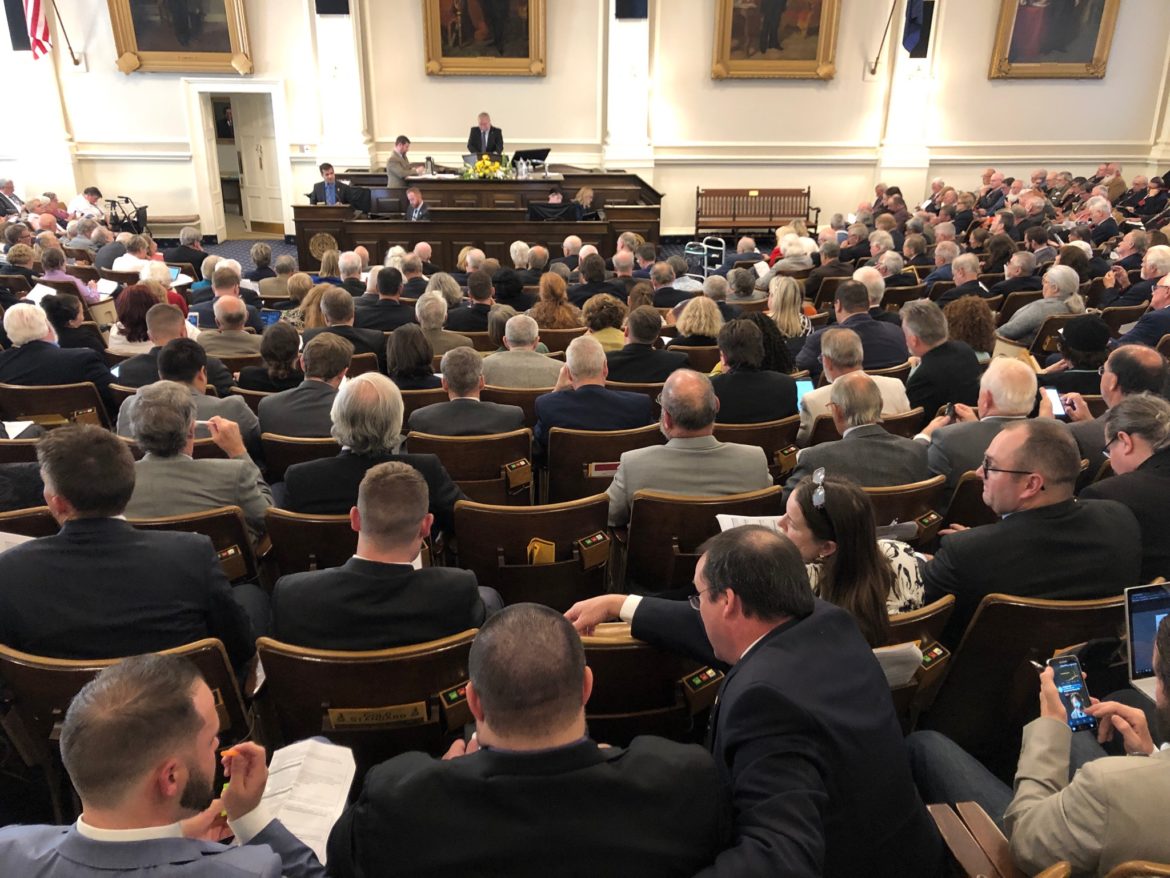By PAULA TRACY, InDepthNH.org
CONCORD – People who have a prescription to use cannabis got one step closer to being able to grow it themselves on Wednesday.
The House of Representatives overrode Gov. Chris Sununu’s veto of House Bill 364 that permits patients and their caregivers to cultivate cannabis for therapeutic use, the only override of 24 vetoed bills the House took up Wednesday.
House Bill 364 now goes to the New Hampshire Senate on Thursday to see if there are enough votes there to override. The bill was passed by the Senate earlier this year on a partisan 14-10 vote. A two-thirds majority vote would require 16 votes if all 24 members of the Senate are present for the vote on Thursday.
Also Wednesday, House Speaker Steve Shurtleff told the body that members are still negotiating with Sununu on the state budget.
“I think we are close,” Shurtleff said. Sept. 25 at 1 p.m. has been set aside for lawmakers to come to Concord so if they do reach an agreement, the legislature can act on a compromise budget. The state is running on a continuing budget resolution that expires at the end of the month.
The
cannabis bill was sponsored by state Rep. Renny Cushing, D-Hampton, who has
argued it would allow patients who may have a hard time paying for their
medication to grow a few plants. The bill limits the amount of marijuana that can
be grown to two ounces.
New Hampshire has five medical dispensaries across the state that provide cannabis to patients for a fee and with a doctor’s order. Currently, there are about 7,000 patients who receive cannabis from the dispensaries, officials said.
In his veto message, Sununu said he was concerned that some of that grown cannabis, or marijuana, would make it to the black market and that it could undermine dispensaries.
The bill limits those who could grow cannabis to people age 21 and over. It was opposed by the New Hampshire Association of Police Chiefs.
Applause broke out in the House when the vote was announced. All the other bills did not reach the required threshold for a two-thirds override.
House Majority Leader Doug Ley, D-Jaffrey, said, “House Republicans decided that providing cover for Governor Sununu is more important than upholding the oath to represent the people of their district.
“Of the bills defeated today, nearly half were originally sponsored by Republicans and three-quarters originally received bipartisan votes in the House,” Ley said.
Sununu said: “I would like to thank the House for their hard work in finally closing the door on so much extreme legislation.
“They tackled many issues and stood up for the people of New Hampshire with their votes to sustain these vetoes. I look forward to tomorrow’s session when the House and Senate will take up the remaining vetoes to ensure that New Hampshire remains the best place to live, work, and raise a family.”
Independent redistricting commission fails
State. Rep. Marjorie Smith, D-Durham said rather than being ordered by a court, this legislature on its own initiative agreed with bipartisan support to create an independent redistricting commission.
Smith said Republicans and Democrats working together agreed that among the practices that sustain government, nothing is more important than free and fair elections.
But the override attempt on House Bill 706 failed on a vote of 227-125.
“That knowledge guided the bipartisan effort that resulted in House Bill 706. We compromised,” Smith said.
Rather than winning parties getting to rework political voting boundaries after elections, the bill would allow for a bipartisan method that would avoid gerrymandering.
“There is no gerrymandering in New Hampshire,” said state Rep. Ralph Boehm, R-Litchfield, with some colleagues responding with boos. “If there was,” he said to Democrats, “you wouldn’t be in the majority.”
Energy bills fail to override
House Bill 183 that supporters said would have helped the state’s biomass industry to survive did not meet the two-thirds majority to override Sununu’s veto.
Another involved expanding the cap on net metering of solar electricity from 1 megawatt to 5 megawatts. House Bill 365 was seen as a way to allow municipalities, schools and some businesses, like Monadnock Paper to benefit from expanding their solar production. The vote failed to meet the two-thirds bar.
Birth certificates
Another bill that came close to meeting the bar was House Bill 446, which would have allowed people to change their gender on birth records.
The vote was 230-148, and the governor’s veto was sustained.
State Rep. Gerri Cannon, D-Somersworth, said there is no uniform way in the state to amend a birth certificate and it has added to a backlog in the courts. She said: “We know we have at least 4,500 transgender residents in the state. I am one of those people.
“Does the gender on my birth certificate impact you?” she asked. “Please consider the rights of your constituents…Please pass this bill on their behalf. Your constituents will thank you.”
But there were opponents.
A birth certificate is a vital and historic record and it would be dangerous to change such records, said state Rep. Joe Alexander Jr., R-Goffstown.
The governor’s veto was sustained.
Voting rights
House Bill 611, relative to absentee voting, failed to get the necessary two-thirds vote. The measure would have not required an excuse for voting by absentee ballot. The vote was 222-157.
House Bill 105, which would have repealed a 2017 measure relative to the definitions of a “resident” for voting, failed as well. Rep. Ley said it should be restored and it is time to end the costly appeals. That vote on HB 105 was 220-156.
House Bill 106 similarly addressed voting rights and also did not achieve the two-thirds majority necessary to override Sununu’s veto. The vote was 224-158.





